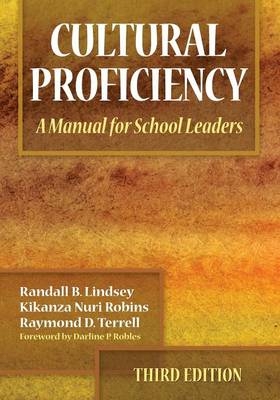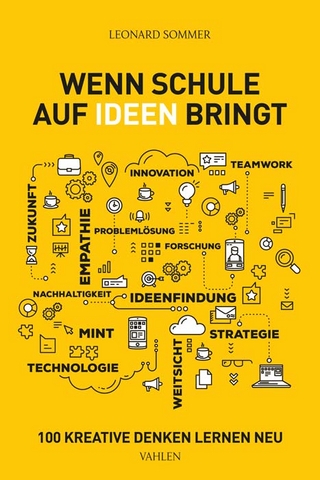
Cultural Proficiency
Corwin Press Inc (Verlag)
978-1-4129-6363-3 (ISBN)
- Titel erscheint in neuer Auflage
- Artikel merken
In the third edition of the bestseller Cultural Proficiency: A Manual for School Leaders, Randall B. Lindsey, Kikanza Nuri Robins, and Raymond D. Terrell expand their groundbreaking model for transforming the challenges of diversity into positive cross-cultural interactions throughout the school system and beyond. Cultural proficiency is a mindset and a worldview assumed by a person or an organization for effectively describing, responding to, and planning for issues that arise in diverse environments. This updated edition incorporates the authors′ latest experiences working with schools, educational agencies, and organizations across the U.S. and Canada. Other additions include:
-A conceptual framework demonstrating the interrelationship of the tools of cultural proficiency
-Updated and expanded content and vignettes
-Several new activities conveniently placed in the Resources section at the back of the book
-A matrix describing how to use the authors′ other books about cultural proficiency
Randall B. Lindsey is Emeritus Professor at California State University, Los Angeles. He has served as a teacher, an administrator, executive director of a non-profit corporation, as Interim Dean at California Lutheran University, as Distinguished Educator in Residence at Pepperdine University, and as Chair of the Education Department at the University of Redlands. All of Randy’s experiences have been in working with diverse populations and his area of study is the behavior of white people in multicultural settings. His Ph.D. is in Educational Leadership from Georgia State University, his Master of Arts in Teaching is in History Education from the University of Illinois, and his B.S. in Social Science Education is from Western Illinois University. He has served as a junior high school and high school teacher and as an administrator in charge of school desegregation efforts. At Cal State, L.A. he served as Chair of the Division of Administration and Counseling and as Director of the Regional Assistance Centers for Educational Equity, a regional race desegregation assistance center. With co-authors he has written several books and articles on applying the Cultural Proficiency Framework in various contexts. Email – randallblindsey@gmail.com Website - CCPEP.org Twitter - @RBLindsey41 Kikanza Nuri-Robins helps people to close the gap between what they say they are and what they actually do. Whether she is in a corporate boardroom, the fireside room of a retreat center, or a convention center auditorium, Kikanza uses her skills and insights to help people and organizations that are in transition – or ought to be. She shares her observations and recommendations with clarity and candor, while gently encouraging them to face the difficult situations that challenge their skill sets and their values. She leads people to this growing edge with unswerving focus, an understanding heart, and laughter that rises from the seat of her soul. Since 1978, Kikanza has worked as an organizational development consultant in a variety of settings including education, health care, criminal justice, and religion, focusing on leadership development, change management, and cultural proficiency. Her clients range from school districts, to university faculty, to government offices and non-profit organizations. The connecting thread is her passion for working with people who want to making a difference for others. Kikanza studied at Occidental College, the University of Southern California, and the San Francisco Theological Seminary. She is the author of many articles and five books, including: Cultural Proficiency and Culturally Proficient Responses to the LGBT Communities. Kikanza lives in Los Angeles where she spends her discretionary time as a textile artist. Raymond Terrell, EdD. retired as Associate Dean for Research and Diversity and member of he department of Educational Leadership at Miami University, Oxford< Ohio. He previously worked at California State University, Los Angeles where he served as Professor of Educational Administration and for five years he was the Dean of the School of Eduction. His journey in education began in a public school district where he taught English to junior and senior high students;. He also was a principal and an assistant superintend in the same district. Dr. Terrell is co-author on a number of books including , Cultural Proficiency: and a A Manual for School Leaders, Cultural Proficient Leadership. His books and numerous articles and life’s work have all focused on issues of equity and inclusion
Foreword to the Third Edition by Darline P. Robles
Foreword to the Second Edition by Carl A. Cohn
Foreword to the First Edition by Asa G. Hilliard, III
Preface
Acknowledgments
About the Authors
Part I. Understanding Cultural Proficiency
1. Cultural Proficiency
Cultural Proficiency – An Inside-Out Approach to Difference
The Four Tools
A Historical Context
What’s In It For Us?
Learning and Teaching Effectively
Living in a Global Community
Participating in the Community
Providing Leadership
The Case
Rolling Meadows Unified School District
Coolidge Unified School District
Resources for Developing Culturally Proficient Leaders
Read the Text First
The Matrix
Going Deeper
Reflection
2. A Cultural and Historical Context for Our Unfolding Democracy
An Inside-Out Approach
What it Takes
Culture is . . .
What Happened to Race?
The Legacy of Segregation and Exclusion
A History of Caste in the U.S.
Labels for Historically Oppressed People
Segregation to Cultural Proficiency
Culture and History Provide Perspective
Going Deeper
3. Leadership for Today’s Schools
Our Journey and Culturally Proficient Leaders
Transformational Leadership
Formal and Nonformal Leaders
Collaborative Leadership
Culturally Proficient Leadership
So, Where Do You Start?
Going Deeper
Reflection
4. Framing Your Work With the Cultural Proficiency Tools
Inside-Out Change
Cultural Proficiency Conceptual Framework
The Four Tools of Cultural Proficiency
Going Deeper
Reflection
Part II. Using the Tools of Cultural Proficiency
5. The First Tool: Overcoming Barriers
Barriers to Cultural Proficiency
This Chapter is for Everyone
Caveat: Systemic Oppression
Caveat: Privilege and Entitlement
Caveat: Unawareness of the Need to Adapt
Changing Educational Practices
Culturally Proficient Educators
Overcoming Resistance
Very Good News
Going Deeper
Reflection
6. The Second Tool: The Guiding Principles of Cultural Proficiency
The Guiding Principles of Cultural Proficiency
Cultural Proficiency as Expression of Values
Principle: Culture is Ever Present
Principle: People are Served in Varying Degrees by the Dominant Culture
Principle: People Have Group Identities and Personal Identities
Principle: Diversity Within Cultures Is Important
Principle: Each Group Has Unique Cultural Needs that Must be Respected
Principle: The Family, as Defined by each Culture, is the Primary System of Support in the Education of Children
Principle: People Who are not Part of the Dominant Culture Have to be at Least Bicultural
Principle: Inherent in Cross-cultural Interactions are Social and Communication Dynamics that must be Acknwledged, Adjusted to, and Accepted
Principle: The School System must Incorporate Cultural Knowledge into Practice and Policy Making
Make it Count
Going Deeper
Reflection
7. The Third Tool: The Cultural Proficiency Continuum
The Continuum
Going Deeper
Reflection
8. The Fourth Tool: The Essential Elements
The Essential Elements of Cultural Proficiency
Analyzing School Leadership
Going Deeper
Reflection
Part III. Making the Commitment to Cultural Proficiency
9. The Case: One Last Look
Matrix: How to Use Cultural Proficiency Books
Resources
Introduction to Resource Activities
Resource A. Understanding Diversity
Activity 1. A Few Definitions
Activity 2. Telling Your Story
Activity 3. Diversity in Your Life
Activity 4. Stand Up
Activity 5. Line Up
Activity 6. Demographics
Activity 7. Starpower
Resource B. Getting to Know Myself
Activity 1. Journaling
Activity 2. Diversity Lifeline
Activity 3. Name Five Things
Activity 4. Who are You?
Activity 5. Who am I?
Activity 6. Cultural Portrait
Activity 7. Personal Stereotypes I
Activity 8. Personal Stereotypes II
Activity 9. Process of Personal Change
Activity 10. Seven Dynamics of Change
Activity 11. Paradigms
Activity 12. Strength Bombardment
Resource C. Getting to Know Your Colleagues and Your Organization
Activity 1. Introductory Grid
Activity 2. Cultural Perceptions
Activity 3. What’s Your Name
Activity 4. Totems or Crests
Activity 5. Family Portrait
Activity 6. Group Stereotypes
Activity 7. Circle of History
Activity 8. Storytelling
Activity 9. Voices that Resonate
Activity 10. Needs Assessment
Resource D. Understanding Power and Privilege
Activity 1. Barriers to Cultural Proficiency
Activity 2. Culturally Incompetent Organizations
Activity 3. Privilege and Entitlement Survey
Activity 4. Listening and Hearing
Activity 5. Seven Minute Day
Resource E. Going Deeper with the Principles
Activity 1. Guiding Principles Discussion Starters
Activity 2. Family Values
Activity 3. My Work Values
Activity 4. Managing Conflict with Our Core Values
Activity 5. Examining Your Organizational Values
Resource F. Going Deeper with The Continuum
Activity 1. The Cultural Proficiency Continuum
Activity 2. Exploring Behaviors Along the Continuum
Resource G. Going Deeper with the Essential Elements
Activity 1. Understanding the Essential Elements
Activity 2. Essential Elements of Culturally Proficient Leaders
Activity 3. Cultural Competence Self Assessment
References
Index
| Erscheint lt. Verlag | 28.7.2009 |
|---|---|
| Verlagsort | Thousand Oaks |
| Sprache | englisch |
| Maße | 177 x 254 mm |
| Gewicht | 710 g |
| Themenwelt | Sozialwissenschaften ► Pädagogik |
| ISBN-10 | 1-4129-6363-X / 141296363X |
| ISBN-13 | 978-1-4129-6363-3 / 9781412963633 |
| Zustand | Neuware |
| Haben Sie eine Frage zum Produkt? |
aus dem Bereich



